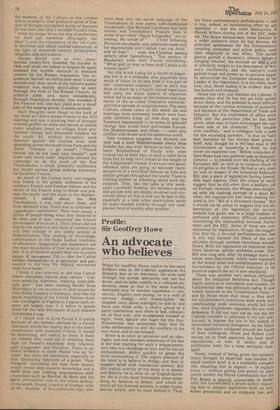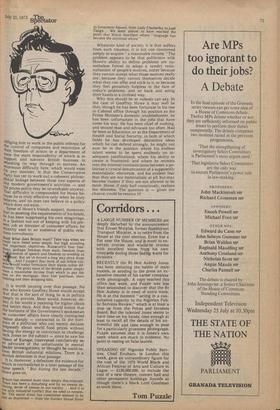Profile: Sir Geoffrey Howe
An advocate who believes
When Sir Geoffrey Howe, said to be the most brilliant man in the Cabinet, appears at the dispatch box or on television, his eyes look through his owlish spectacles not out but down, and he talks rapidly in a cultured undertone, more or less in the same hurried, dedicated way he smokes cigarettes — constantly. Slightly over-plump, he is a well of nervous energy, and indefatigible. He stopped, once, about midnight, to talk to, and' have one drink with, a chatty group at a party conference; sent them to bed, exhausted, at four a.m.; and re-appeared himself at eight, fresh, spruce and eager for the fray. Nonetheless, one sometimes feels that he talks deliberately to still the conflicts in his own mind, and to tire himself.
Howe is at once an advocate and an ideologist; and one wonders sometimes if the Bar is the best training for such a temperament. Any idea is a challenge to him, and he has an extraordinary ability quickly to grasp the facts surrounding it. The urgent pressure of his mind is to believe in things, and then to support belief with intellectual armour. But the typical activity of his mind is to dissect and destroy: he is, after all, an English barrister. He is at his most formidable when something he believes in deeply, and which attracts all his forensic powers, is under fundamental attack, and he must defend it. Thus, his finest parliamentary performance — and it was, indeed, an outstanding effort by anY standard — was the utter destruction ol Harold Wilson during one of the EEC debates. The Howe mannerisms, made familiar to a wider audience since he has become the principal spokesman for the Government's creaking consumer and prices policy, were then employed to real effect. The owlish glance gained a moment's silence before a stinging rebuttal; the donnish air lent a sort of scholarly weight to his description of Wilson's vacillations; and the lawyer's voice gained range and power as, in genuine anger, he denounced the European apostasy of the Leader of the Opposition. It is not often, however, that Howe makes it so evident that he has bottom and stomach.
Howe has only just reached the Cabinet. It seems clear that he has not yet fully settled down there; and his position is more difficult because of the curious structure of authority and decision of the Department of Trade and Industry. But his experience of office since 1970, and the particular jobs he has been given, seem also to have encouraged the narrower side of his character. " The trouble with Geoffrey," said a colleague with a taste for the wounding paradox, "is that as Ted's best barrister he has always been given a brief. And, though he is the best man in the Government at mastering a brief, he has never yet mastered one." Before consumer affairs Howe had two political jobs as Solicitor' General — to preside over the drafting of the European Bill, as well as to conduct much of its progress in the House. He had a very similar task in respect of the Industrial Relations Bill, also a piece of legislation having formidable legal aspects. Only the critics of entry suggest that he did other than a brilliant job on Europe: certainly, the Whips were delighted with his dashing concept of a short Bill when the cognoscenti had been looking forward to the " Bill of a thousand clauses." But it would not be unfair to suggest that the abbreviat:on of the legislation for tactical reasons has given rise to a large number of profound and extremely difficult problems concerning the relationship between Parliament and the EEC. Some of these are constitutional by implication, though the suggestion that he, a devoted parliamentarian, has in any way harmed the fabric of the constitution through careless cleverness wounds Howe. With the legislation on industrial relations, however, similar problems arose. That Bill was long and, after its passage many lacunae were discovered, which were exploited to the mixed relief and embarrassment of the Government by the Official Solicitor: in its punitive aspects the act is now moribund.
There was another very serious difficulty about the Industrial Relations Act. Though highly political in conception and content, its fundamental idea was politically naive. It was widely believed in the Conservative Party — and by Howe more than most — that once the Government's intentions were made law. caterwauling trade unionists would fall into line, since Englishmen regarded the law with deference. It did not turn out so; nor did the Cabinet consider it judicious to try too strenuously to impose the law in the middle of threatened industrial disruption. As the fabric of the legislation collapsed around the heads of their colleagues, Howe and Robert Carr moved on to fresh pastures; but both their reputations, as men of ability and as politicians, were, for a time, seriously damaged.
Howe, instead of being given the ministry many thought he deserved, was handed instead another brief. It is a markedly complex one, requiring him to explain — or explain away — without giving him power to alter (since neither the Prices Commission nor the Pay Board is dir.ectlil answerable to ministers) the Government s prices policy; requiring him to prepare legislation both on consumer protection and on company law; and
Obliging him to work in the public inferest for the control of companies and restriction of their freedom of action in a department of state the main responsibility of which is to support and subvent British business in srnashing its way through to success. An enormous difficulty here, which would exist for any minister, is that the Conservative Party has yet to work out a coherent philosoPhical linkage between these two aspects of any modern government's activities — and ,the prices policy may be unworkable anyway. lhat difficulty is compounded for Howe because he is truly effective only when he truly believes, and no man can believe in a policy Which does not exist.
Some of Howe's friends suspect, moreover, t,hat in meeting the requirements of his briefs, n e has been suppressing his own misgivings. In a fashion not out of keeping with his present job as minister of consumer affairs, he recently said to an audience of public relations consultants:
Well! What does Britain want? Time was when we ,could have listed some simple, but high sounding !nd important objectives. Roosevelt's four freePins, perhaps: freedom from want, freedom from 'e reedom of speech and freedom to worship as ase. But we've moved a long way since those ... And I suspect that most of our fellow citizensilvould today formulate their wants rather differently. The great mass of the British public simply Want a reasonable income from which to pay the rent or the mortgage, their hire purchase, their Clothing and their shopping bills.
It is worth pausing over that passage. No one who knows Geoffrey Howe would accept that that is the sort of thing he is in politics sirnply to provide. Most would, however, detect in his words a yearning for higher ideals and better days. And they would notice that the horizons of the Government's spokesman oh consumer affairs have clearly contracted rather sharply — contracted to fit the hori,4ons of a politician who can merely declaim helplessly about world food prices without having the energy or conviction to challenge Jack Jones on the subject — since he saw his viiion of Europe; intervened conclusively as an advocate of the unfortunate in mental health investigations; or thought he could reform British industrial relations. There is a terrible defeatism in that passage.
It is, moreover, a defeatism the evidence for Which is contradicted in a later passage of the !rne speech. But during the last decade," rlowe goes on,
tritain has seemed more than simply discontented. !here has been a disturbing and by no means declining, sense of unease in our society... And it is ,Ilot only industrial conflict that we need to remem,uer. The social scene has cometimes seemed to be Jast as disjointed — from the Garden House Hotel
to Grosvenor Square, from Lady Chatterley to Last Tango. . We seem almost to have reached the point that Kraus described where "language has become the universal whore."
Whatever kind of society it is that suffers from such traumas, it is not one concerned simply to acquire " a reasonable income." The problem appears to be that politicians with Howe's ability to define problems are nonetheless forced to adopt a tawdry rationalisation of people's motives, either because they cannot accept what those motives really are; because they cannot themselves decide what they can offer and stick to it; or because they feel genuinely helpless in the face of today's problems, and sit back and wring their hands in a civilised way.
Why this should be so nobody can say. In the case of Geoffrey Howe it may well be that, though he has been fortunate in his rise to Cabinet office through his position as the Prime Minister's domestic troubleshooter, he has been unfortunate in the jobs that have come his way. He has been chief of nothing, and second man and advocate too often. Had he been at Education, or at the Department of Health and Social Security, in both of which fields he has developed distinctive ideas which he can defend strongly, he might not now be in the position where his endless talent seems to be spent endlessly on inadequate justifications; where his ability to create is frustrated; and where he retreats into the internal contradictions between a politician's cynical denunciation of a supposedly materialistic electorate, and his evident fear that they are not materialistic at all, but may become violent if they are not allowed to be more. Howe, if only half-consciously, realises the dilemma. The question is — given the chance, could he resolve it?































 Previous page
Previous page